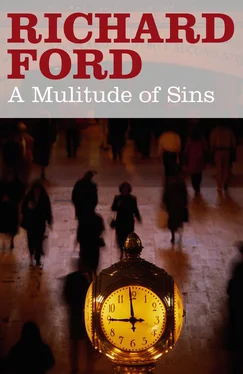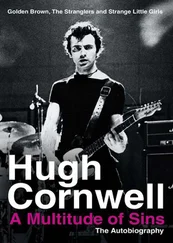Stepping out into the wide, bright lobby, Henry refocused his eyes to the light and the new, congested atmosphere, a throng of hotel guests pulling suitcases on wheels toward the revolving doors and out to the street. Many were smiling, slow-moving elderlies with plastic cards strung around their necks and little fanny packs full of their valuables; most were speaking indecipherable French. He felt, he realized, absolutely calm.
The lobby otherwise offered a pleasant, inauthentic holiday-festive feel, with big gold-and-glass chandeliers and humming activity. It was like a stage lighted for a musical before the principals came on. He strolled out toward the middle, beyond which showcase windows of the expensive clothing stores and gift shops lined the street side, and the people gazing in the windows looked pleased and well cared for, as though they were expecting something happy to occur soon. It felt like the Mayflower in Washington, where he used to meet clients. And at the same time it felt foreign in the comfortable, half-mysterious way Canada always felt; as if the floors had been tilted three degrees off from what you were used to, and the doors opened from a different side. Nothing you couldn’t negotiate. America, run by the Swiss, Madeleine said.
From the crowded middle-lobby, he observed no one who might be a Jeff. A group of small American-sounding children trooped past in a ragged line, all wearing quilted white tae kwon do uniforms and holding hands. They too were headed toward the revolving doors, followed by some large, middle-aged black ladies, eight of them, all dressed in big quilted fall frocks with matching expensive-looking feathered hats. Southerners, he realized — the ladies all talking far too loud about their bus trip down to Maine this afternoon, and about something that had happened in the night that had been scandalous and was making them laugh.
Then he noticed a man watching him, a man standing beside the entrance to the English sweater shop. He couldn’t be Madeleine’s husband, Henry thought. He was too young — no more than mid-twenties. The man wore black jeans, white sneakers and a black leather jacket; he had rough crew-cut blond hair and was wearing yellow aviator glasses. He looked like a college student, not an architect. If the man weren’t staring at him so intently, he would never have noticed him.
When Henry again caught his eye, the man abruptly began walking straight toward him, hands thrust inside his black jacket side pockets, as if he might be hiding something there, and Henry realized this man was in fact Madeleine’s husband, could only be him, despite looking ten years younger than Madeleine, and twenty-five years younger than himself. This would be different from the rendezvous he’d anticipated. It would be easier. The husband wasn’t even very big.
When he was ten feet away, just at the edge of the crimson carpet, the man stopped, his hands still in his pockets, and simply stared, as if something uncertain about Rothman— something unassociated in his identity — needed to be certified.
“I’m probably who you’re looking for,” Henry said across the space between them. He noticed again the tae kwon do kids still filing out toward the street, still holding hands.
Madeleine’s husband, or the man he thought was Madeleine’s husband, didn’t say anything but began walking toward him again, only slowly now, as if he was trying to give the impression that he’d become intrigued by something. It was all too ridiculous. More theatricality. They should have lunch, he could tell the man a lot of lies and then pay the check. That would be good enough.
“I saw your picture,” the young man said, actually seeming to sneer. He didn’t remove his hands from his pockets. He was much smaller than expected, but very intense. Possibly he was nervous. His aviator glasses emblemized nervous intensity, as did the black jacket zipped up to his neck so you couldn’t tell what he had on underneath it. Madeleine’s husband was handsome but in a reduced, delicate, vaguely spiritless way, as if he’d once failed at something significant and hadn’t altogether gotten over it. It was odd, he thought, that Madeleine could find them both — himself the big cumbersome Jew and this small, insignificant French-seeming man — attractive.
“I’m Henry Rothman.” He extended his large hand, but the husband ignored it. What picture had he seen? One she’d taken, he supposed, and rashly kept. A mistake.
“Where the fuck’s Madeleine?” the young man said.
These were like the words he’d said on the phone, yet he didn’t seem like a young man who would say such a thing, or whatever he’d said. Cockroach. Sucking your dick. He didn’t seem that vulgar. It was absurd. He felt completely in control of things now. “I don’t know where Madeleine is,” he said. And it was true, which made him relax even more. He was prepared to offer a quick trip up to the room. But Madeleine had a habit of leaving earrings, toiletry essentials, articles of underclothing wherever she’d been. Too risky.
“I have an eight-year-old son,” the intense, bespectacled young man said, and seemed to set his shoulders inside his bomber jacket. He blinked at Henry and leaned forward on the balls of his feet, making himself appear even more reduced. His eyes behind his yellow lenses were the blandest uninflected brown, and his mouth was small and thin. His skin was soft and olive-tinted, with a faint flush of emotion in his cheeks. He was like a pretty little actor, Henry thought, clean-shaven and actorishly fit-looking. Madeleine had married a pretty boy. Why indeed ever have a Henry Rothman in your life if this boy appealed to you? It made him feel his most human qualities had been appropriated for purposes he didn’t approve. It wasn’t a good feeling.
“I know you do,” Henry said about the business of the child.
“So, I don’t want to fuck with you,” the young man said, reddening. “I’m not about to let you fuck up my marriage and keep my son from having two parents at home. Do you understand that? I want you to.” His soft boy’s mouth became unexpectedly hard, almost snarly. He had small, tightly-bunched square teeth that detracted from his beauty and his anger and made him seem vaguely corrupted. “If it wasn’t for that, I wouldn’t give a goddamn what you and Madeleine did together,” he went on. “Fuck in hotel rooms all over the planet and I couldn’t give a shit.”
“I guess you’ve made your point, then,” Henry said.
“Oh, am I making a point?” Madeleine’s husband said, widening his eyes behind his idiotic lenses. “I didn’t realize that. I thought I was just explaining to you the facts of life, since you’re way out of touch with them. I wasn’t trying to persuade you. Do you understand?” The boy didn’t remove his eyes from Henry’s. An aroma of inexpensive leather had begun wafting off the black jacket, as if he’d bought it just that day. Henry began to consider that he’d never owned a black leather jacket. In Roanoke, well-off doctors’ sons didn’t go in for those. Their style had been madras sports coats and white bucks. Jewish country club style.
“I understand what you mean,” Henry said in what he assumed would seem a fatigued voice.
Madeleine’s husband glared at him, but Henry realized that he himself wasn’t the least bit more serious about this. Merely less engaged. And he would be willing to bet money Madeleine’s husband wasn’t serious either, though he perhaps didn’t know it and somehow believed he felt great passion about all this baloney. Only neither of them was truly up against anything here. Everything they were doing, they were choosing to do — he was choosing to be here, and this Jeff was choosing to put this unconvincingly ferocious look on his face. They should talk about something else now. Ice hockey.
Читать дальше












